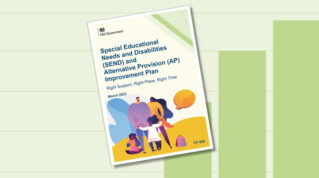Last Friday, Schools Week ran an interview about the SEND system with Tony McArdle, an adviser to the Department for Education. It wasn’t a pleasant read – but it was an important one. The public doesn’t often hear from McArdle, and he offered an important glimpse into the future of the SEND system.
However, while McArdle is right to say that the SEND system “manifestly doesn’t work any more”, he’s wrong in his diagnosis and his framing of risk. We have deep concerns about the SEND review’s direction of travel. It’s largely been carried out behind closed doors by the same cadre of leaders and advisers who blithely drove the SEND system over a cliff pre-pandemic. These leaders have concluded that we – families and schools – are the main problem with the SEND system.
Mr McArdle sees the SEND crisis as a “demand” problem. Too many children and young people with EHCPs, too many who don’t really need them, too many in expensive specialist provision. His recipe for a healthy SEND system means families and schools have to stop sucking an already depleted system dry. It’s about parents knowing their place, and schools – particularly mainstream – doing more with less.
What specific evidence does McArdle offer for this alleged EHCP excess? He doesn’t – which is surprising, given we’re over 1,270 days into the SEND review, with a supply-side crisis visible from space.
Ofsted has now inspected every local area’s SEND services. Most have significant weaknesses, and none of those that Ofsted identified featured an excess of EHCPs. Dysfunctional leadership? In spades. Defective joint working? Widespread. Kafkaesque processes? Rampant. All supply-side problems.
The only people who believe it’s too easy to get an EHCP are those who’ve never tried to get one. And nobody gets a first-draft EHCP as tightly-written as McArdle’s own ‘golden ticket’ – a 28-page, £50,000 contract. Poor LA decision-making is why they only have a 3.7 per cent success rate at SEND tribunal hearings, a performance 12 times worse than the Home Office achieves at immigration tribunals.
How leaders frame risk tells us a lot. McArdle made his views clear: he primarily wants to stop the financial dysfunction in the SEND system damaging more important things. These leaders are not acting to save children with SEND from the system but to save the wider system from SEND.
McArdle’s ‘safety valve’ scheme demonstrates this. We dug into the KPIs that councils have to meet. They’re financial, psychotically precise, and come with swift consequences if LAs fail to meet them. Without meaningful accountability elsewhere in the system, they’re an open invitation to more unlawful behaviour from LAs.
We have not seen a single ‘safety valve’ KPI that tracks outcomes for disabled children. Over three years into the SEND review, we still don’t know how the DfE measures value for money in SEND. We asked them. They’re not telling.
Getting parents and schools to do more with less might work for system leaders. But you’d have to be absolutely detached from front-line reality to believe that it’ll work for children with SEND, particularly given the pressures that schools and colleges are under right now.
Are they detached from reality? Ask McArdle, who thinks parents and school staff do what we do “because that is seen as the game you need to [play]”.
It’s not a game to us, Tony. It’s not a game to the deaf pupil we recently supported whose LA tried removing him from his special school while his mother was dying from cancer. It’s not a game to special school leaders with ravaged budgets and staff shortages who are desperately trying to work out how to operate safely.
It’s not a game to mainstream teaching assistants who are losing their jobs because their LA won’t increase top-up banding because their safety valve agreement forbids it. And it’s not a game to families who lose their jobs, savings, houses and mental health to get something that most families can take for granted – an adequate education for their children.
It’s not a game, Tony. It’s our lives and our children’s futures. We don’t get to choose if we play.

















Your thoughts